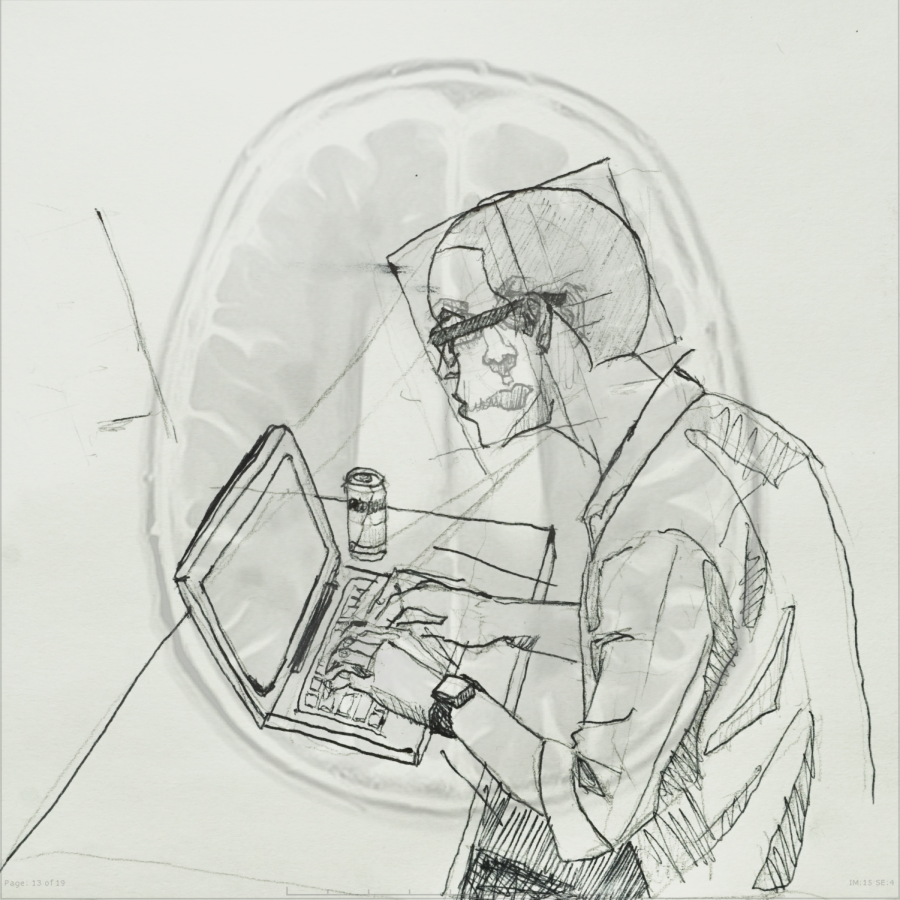Kincart: Grind Culture Isn’t Worth It
(Graphic by Cyan Larson | The Daily Utah Chronicle)
August 28, 2021
My life is much more “rise and grind” than “rise and shine” these days. With summer classes, internships and extracurriculars, I am pretty busy. I recently came across a photo of my monthly calendar from high school. Wow, did I give in to the pressures of grind culture. At least, I gave in to the pressures far more than I do now. Back then, I filled my schedule with every extracurricular and AP class imaginable — regardless of my interests. This year, I’ve learned to narrow my involvement.
My over-involvement reached its pinnacle during March of 11th grade. Over the span of 10 days, I spent five hours sleeping in my own bed. I got home from a debate trip at about midnight and had to be at the school at five in the morning for a robotics trip. COVID-19 hit towards the end of my last year of high school and it forced me to slow down. During my time at home, I recognized how unsustainable my involvement habits were. Although I wasn’t letting my responsibilities slip, I wasn’t taking care of myself.
In college, I’ve tried to avoid the pressures of over-involvement that once consumed me. Although I’m nowhere near perfect, I’m doing much better. I make time to socialize with friends outside of my academic bubble, read for leisure and sleep an appropriate amount. Societal pressures to be over-involved while in college are all-consuming. It’s not worth it — nor is it good for you.
College admissions are more competitive in recent years — especially given the pandemic. Over-involvement likely increases for this reason. Most of my high school involvement was so I could get into a competitive university. I kept adding activities to my plate to build my resume. Over-involvement is common for students of affluent families. Clubs, music lessons and sports keep students busy. But working falls into the category of extracurriculars too. The challenges of working while learning affect low-income students to a greater extent. These pressures to excel in academics and other extracurriculars can manifest in middle school. Don’t feel guilty if you are relating to any of this. It’s hard to escape the pressures that surround us. They don’t surround us any less in college, and it’s time we recognize the toll this takes.
How do you fit more activities into your schedule? You cut out sleeping, eating, exercising and social activities — all of which are important to your overall health. During high school, I went to bed around midnight and woke up at 5:30 in the morning. That is a serious problem. Johns Hopkins Health writes that sleep deprivation “can affect your mood, memory, and health in far-reaching and surprising ways.”
It can lead to an increased risk of dementia, fatal car crashes and the development of type 2 diabetes. Over-involvement can also lead to immense amounts of stress. Stress leads to weakened immune systems, high blood pressure, fatigue, anxiety and depression. I think I’m finally starting to understand why I caught so many colds. The side-effects of over-involvement have lifelong consequences that shouldn’t be ignored. To avoid these consequences, let’s reframe how we look at our involvement.
You should only participate in activities you care about. Never do something just for your resume. At the same time, it’s important not to judge people working a job they don’t absolutely love. Work is a necessity, and it’s privileged to assume everyone can go after their desires. Additionally, depth in activities is equally important, if not more, than breadth. Spend time diving into what you love instead of adding more half-hearted activities to your plate. Learn to set boundaries, even for the things that you care about. Don’t let them consume you to the point of compromising your health. Engage in physical activity and practice relaxation techniques to reduce stress. Most importantly, take time to make these adjustments — they don’t come naturally in a society that pressures us to be as involved as possible. It took me years of introspection and listening to Michelle Obama’s podcast to convince me to change my habits. And, I still have a long way to go.
As students, society pressures us to be as involved as possible. It’s an easy culture to give into while in college. But for your health and mental wellbeing, take care of yourself. Grind culture persists because we encourage it. As we adjust our mindset, this toxic culture can change. Your perfect balance will be different from your peers, but nonetheless, seek that balance while in college.













